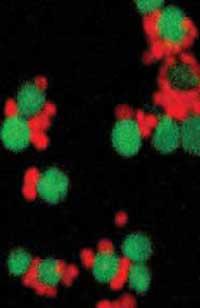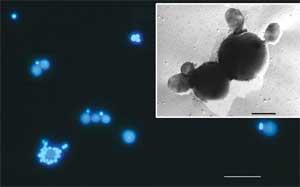Nanoarchaeum equitans, first member of a new group of living things

These beings have been found by a group of scientists who study the hydrothermal chimneys located on the seabed of the Icelandic coast. Chimneys are produced by water and gases coming out of the interior of the ground at enormous pressure. Thirty years ago, scientists discovered a richer fauna than expected in this extreme area.
On this occasion, the team of scientists studying the microorganisms of the chimneys of the Icelandic coast has by chance made a bigger discovery than expected.
When taking and analyzing samples of rocks and gravel near the chimneys, they realized that along with the new species of the genus Igniococcus, which is part of the group of archaeologists, there are other smaller spherical structures. The new beings have a diameter of 400 nm and have been seen with in-situ dyeing with their own DNA. When identifying an RNA molecule of being it was deduced that it was related to archaea. However, it does not have much to do with archaeologists that are known so far. So they have formed a new team, the nanoarches.

As the name suggests they are very small microorganisms with a tiny genome of 500 kilobases. Only those who live with Igniococcus are known and the relationship between them is unclear.
Nor do they know the origin of nanoarchaeologists. Some believe that it can be a type of intermediate cell between the first cells that appeared on Earth and the current ones, that is, a primitive form that until now had not been detected. Others consider that a small and simple form can be the influence of evolution, that is, a being that starting from more complex arches, due to its living conditions, has simplified its metabolism due to evolution.
Buletina
Bidali zure helbide elektronikoa eta jaso asteroko buletina zure sarrera-ontzian











